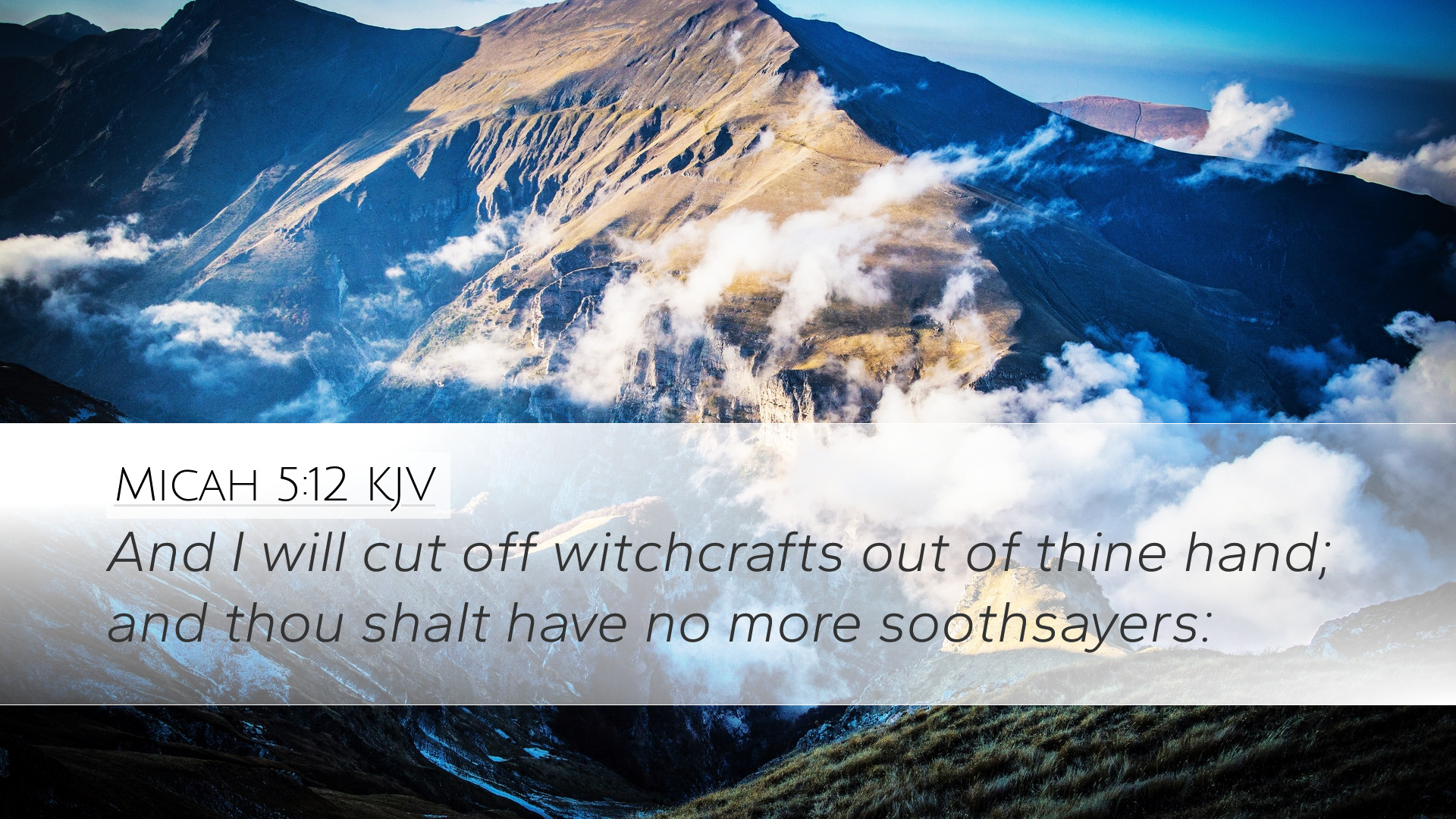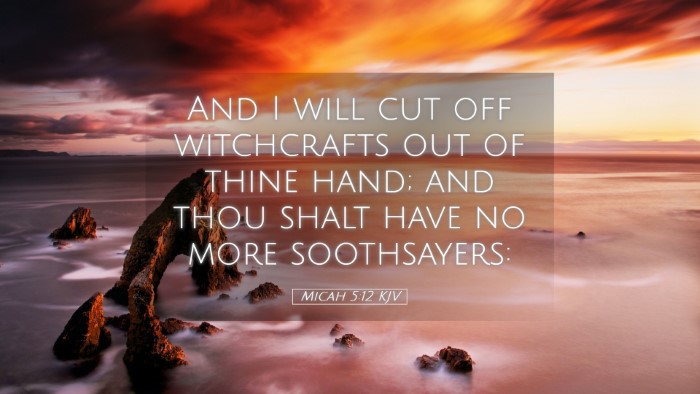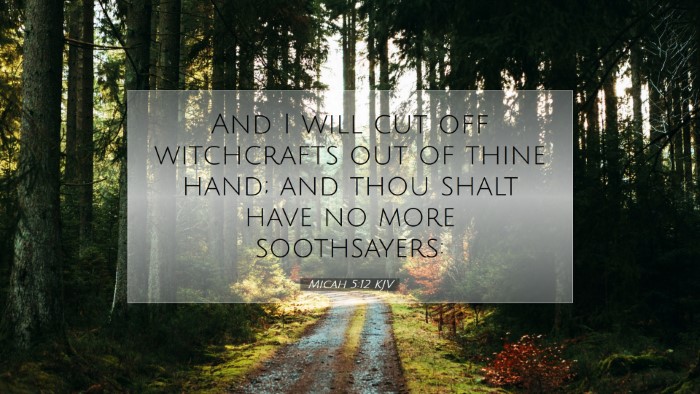Old Testament
Genesis Exodus Leviticus Numbers Deuteronomy Joshua Judges Ruth 1 Samuel 2 Samuel 1 Kings 2 Kings 1 Chronicles 2 Chronicles Ezra Nehemiah Esther Job Psalms Proverbs Ecclesiastes Song of Solomon Isaiah Jeremiah Lamentations Ezekiel Daniel Hosea Joel Amos Obadiah Jonah Micah Nahum Habakkuk Zephaniah Haggai Zechariah MalachiMicah 5:12
Micah 5:12 KJV
And I will cut off witchcrafts out of thine hand; and thou shalt have no more soothsayers:
Micah 5:12 Bible Commentary
Commentary on Micah 5:12
The verse Micah 5:12 states: "And I will cut off witchcrafts out of thine hand; and thou shalt have no more soothsayers." This verse is part of a prophetic message addressing the future hope of Israel juxtaposed against the corruption and idolatry prevalent in the nation. It highlights the eradication of sinful practices, particularly those related to the occult, as a sign of God's restoration.
Contextual Background
Micah, a prophet from Moresheth, prophesied during a tumultuous period for Israel, specifically during the Assyrian threat. His messages are rich in themes of justice, judgment, and hope for redemption.
In this chapter, Micah shifts focus from the destruction that is impending to the promised restoration that will come through the future Messiah. The verse in question points towards a purification of Israel that will occur as a consequence of the Messiah’s coming.
Insights from Public Domain Commentaries
Matthew Henry's Commentary
Matthew Henry emphasizes the seriousness with which God views practices related to witchcraft and sorcery. He notes that such practices are a direct opposition to the true worship of God. The mention of cutting off witchcrafts signifies a divine intervention where God removes these corrupting influences from His people. Henry asserts that this act of cutting off signifies both a removal of the sinful practice and the practitioners who mislead the people.
Furthermore, Henry reflects on how the presence of these practices serves as a symptom of a deeper spiritual malaise—idolatry and rebellion against God's ways. In the coming days of the Messiah, God's people will not only turn from these abominable practices but also embrace the purity and righteousness that He desires.
Albert Barnes' Notes on the Bible
Albert Barnes adds that this prophetic declaration speaks not just to the elimination of external influences but also to an internal change within the hearts of the people. He explains that the phrase "thou shalt have no more soothsayers" indicates a complete absence of those who once led the community into deception through false prophecy and divination.
Barnes explains further that the reference to “witchcrafts” includes all forms of divination and sorcery that relied on supernatural forces contrary to God. He highlights that such practices were not only forbidden but were seen as undermining the sovereignty and providence of God. In the new order that the Messiah establishes, these practices will be rendered obsolete as His people learn to trust in the Lord alone for guidance.
Adam Clarke's Commentary
Adam Clarke provides a thorough examination of the term “witchcrafts.” He notes that the original Hebrew term implies a range of magical practices and illicit knowledge which were pervasive in the surrounding cultures. Clarke points out that such practices were particularly alluring to the people of Israel, often leading them astray from true faith.
He discusses how the spiritual awakening and reformation that the Messiah will bring include a total dismissal and rejection of these practices. Clarke draws attention to the implications of this verse for the understanding of spiritual authority, emphasizing that true prophetic voices will rise in place of the falsehoods. God's intention to cut away these corrupting influences signifies His commitment to purifying His people.
Theological Implications
When examining Micah 5:12 through the lenses provided by these commentators, several theological implications arise:
- The Sovereignty of God: The act of cutting off witchcrafts underscores God’s control over falsehood and deception in the midst of His people.
- Call to Purity: God’s desire for His people to be free from influences of the occult and false teachings speaks to the importance of holiness and purity in worship.
- Messianic Hope: The verse also embodies the hope that the coming Messiah will lead His people into a renewed relationship with God, free from the burdens of sin and idolatry.
- Replacement of Falsehood with Truth: The removal of soothsayers paves the way for genuine revelation from God, affirming the necessity of true prophetic voices in the church.
Practical Applications for Pastors and Theologians
In light of the insights gathered from the public domain commentaries, there are several practical applications for pastors, students, and theologians:
- Emphasize Teaching Against the Occult: Churches must remain vigilant in educating congregants about the dangers of occult practices, fostering environments where truth prevails.
- Foster True Prophetic Ministry: Encourage an atmosphere where genuine prophetic ministry can flourish, based on a solid foundation of Scripture rather than sensationalism or personal ambition.
- Promote Spiritual Discernment: Equip church members with the ability to discern between the true voice of God and falsehood, thus protecting themselves from deception.
- Lead Toward Holiness: Modeling a life of purity and commitment to God's standards can inspire congregants to embrace similar values in their spiritual journeys.
Conclusion
Micah 5:12 serves as a profound reminder of God’s capability and desire to cleanse His people from practices that stand against His holiness. The insights from Matthews Henry, Albert Barnes, and Adam Clarke collectively urge a reflection on the seriousness of our spiritual influences and the necessity of aligning with God’s truth. For those in pastoral and theological spheres, the call remains to guide others towards spiritual integrity, rooted in the hope and redemption found in Jesus Christ.


